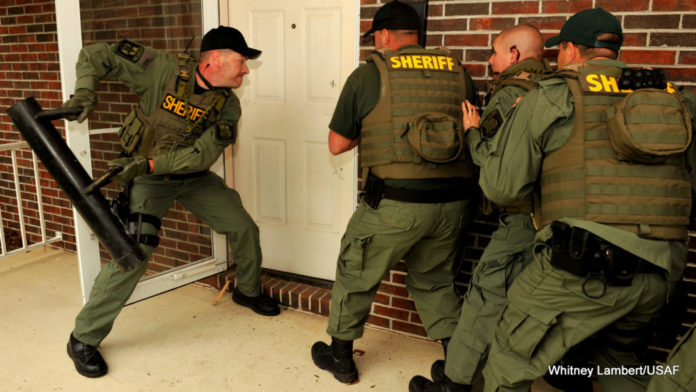
As we have seen time and time again, rights can never be granted, only withered away. Such is the case again. Earlier this year, the state Supreme Court of Wisconsin passed a ruling, which will now mold future Fourth Amendment decisions. They found that police can lawfully enter your home and seize evidence without a warrant under an expansion of what is known as the “community caretaker” clause.
The decision was over the case of Charles Matalonis. Matalonis was in a fight with his brother, whom police found battered at a nearby house. When the police responded, they were met by Matalonis who allowed them into the house where they observed cannabis and blood. The police encountered a locked door and demanded that it be opened. Matalonis, knowing his rights, demanded they get a warrant. The cops refused and broke down the door. Behind the door they found a cannabis grow room and arrested Matalonis for cultivation. Matalonis fought the arrest through to the Supreme Court of Wisconsin.

Traditionally, a case like this would never have made it to the Supreme Court. If the cops on scene wanted access to the room because they suspected Matalonis was growing pot, the correct procedure is to hold Matalonis until a warrant arrived, which in this case, shouldn’t have been hard. The cops chose to violate procedure and Matalonis’ rights to make an arrest. One might ask how the case – which had a clearly established protocol requiring a warrant – could end up destroying the Fourth Amendment. The decision came down to a newly appointed judge, who hadn’t even been in court on the day the case was argued. His uneducated decision on past U.S. Supreme Court rulings led to the 5-4 vote.
This very same Supreme court has previously ruled on cases like this, upholding the police need to obtain a search warrant. The prosecutor, however, presented the search as lawful under the community caretaker clause, which basically says that police have a right to search for other injured parties within the house. Under the community caretaker clause, any evidence in plain view becomes lawfully admissible in court. Typically, when police respond to a call of violence in a residence, they have the right to conduct a protective sweep. This is fundamentally, a check for other injured parties in the house.
The problem with applying the community caretaker ideology, in this case, is that there was no suggestion of anyone else in the house, and the police intent was to search for drugs. The intent of the officer should have decided this case, yet it didn’t.
Of the challenging justices, one argued “by the time officers entered the locked room, some 20 minutes or more after they had been in the house, there was little reason to suspect someone else was in the bedroom, but plenty of reason to suspect it might house marijuana.” Unfortunately, the rational judgment of one justice does not make a verdict. The judges who voted in favor of upholding the lower court’s ruling chose to ignore the greater constitutional problems of the officers’ actions.
Justice Rebecca Bradley could cast a vote, despite it being the first time in the history of our judicial system that a supreme court justice could participate; although not having been involved in oral arguments. As per former Wisconsin Supreme Court Justice Shirley Abrahamson, “no precedent appears to exist in the USSC or in this court for a new justice who did not participate in oral arguments to participate in the case without re-argument.”
Basically, a crucial Fourth Amendment decision was made by a single person who was not elected, and had no previous participation in the case. Hopefully this case will make its way to the U.S. Supreme Court, where it will undoubtedly be challenged.
Sources: The Free Thought Project.
This article (Wisconsin Supreme Court Guts Fourth Amendment in Unprecedented Decision) is a free and open source. You have permission to republish this article under a Creative Commons license with attribution to the author and AnonHQ.





In France now, my country, police have the right to break in to your house, place electronic bugging device, they can also enter your home and search.
They can of course tap-wire your phone too.
All this without a warrant, discretionary to police units will….!!
the national laws passed during the height of fear of terrorism, opened the door for many of our rights being taken from us. Fear is their greatest tool, when we are afraid we are irrational creatures.
Most people are irrational most of the time. That’s why they so easily give up liberty for protection. Our government has to eradicate the constitution in order to impose total control. To due that they must eliminate the 1st, 2nd,and 3rd ammendments as the while of our democracy is balanced on them.